Dear Mr. Henshaw (Avon Camelot Books)
 I dislike Beverly Cleary. Her books are unimaginative, puerile garbage, and she writes in the stilted language of her child narrators to make up for her own lack of ability.
I dislike Beverly Cleary. Her books are unimaginative, puerile garbage, and she writes in the stilted language of her child narrators to make up for her own lack of ability. "Dear Mr. Henshaw" is in many ways her most nauseating work. In it, a troubled young boy, Leigh Botts, writes to his favorite author. The subjects of these letters fall into three categories; the mundane, the pseudo-philosophical, and the blatant appeals to emotion.
The mundane includes such riveting subjects as the person who steals from Leigh's lunch. I never found this entertaining, even when I was 8 years old and dealing with this stuff myself. Perhaps a very talented writer could write about it in an appealing manner. However, Cleary, as usual, is missing the ingredients of humor and perspective! These trivial parts of a child's life are never presented in a funny manner, or even from a unique point of view. As such, they're drab.
Someone stole Leigh's food. It sucks. He's frustrated. The end.
However, even such tedium is vastly preferable to Cleary's sad attempts at philosophy. Look, she's a hack who mass-produces crappy children's books, not the second coming of Nietzsche or Spinoza. The fact that she seriously thought she could tackle this stuff belies her arrogance.
At one point, Leigh and Mr. Henshaw discuss what happens after one's death. It's a universal subject with countless books written about and religions spawned around it.
What does Cleary, through these two characters, think of the matter? Nothing noteworthy! Only that there might be nothing at all after death, which, by the 1980s, is akin to saying the sky is blue.
All these pseudo-philosophical ramblings are consistently kept at a very shallow, surface level, and usually lead nowhere.
Lastly, Cleary for the emotional jugular with tales of Leigh's deadbeat father. It was Stephen King who, in "The Dark Tower" series, noted how easy it was for children's books to draw emotion from their young readers. To get them to cry and feel vicarious misery is easy.
Hacks like Cleary will abuse this power over their young audience and use it in lieu of a good plot and engaging characters. In "Dear Mr. Henshaw", it literally serves no purpose than for its young readers to feel sadness for Leigh.
(Also, spare me the nonsense about this being some deep metaphor for the Cold War. Anyone can write a garbage book, claim it's some deep metaphor for post-colonialism/feminism/cause de jour and have idiot "academics" lap that shit up)
When we read "Dear Mr. Henshaw" in elementary school, the 160 pages, full of inane tedium, pretentious, banal bullshit, and disgusting appeals to innocent child emotions were sheer torture.
If you like torturing kids, make them read this book. And if you're not a sadist, avoid it like the plague.
The Sign of the Beaver
 "Forgettable" would be the understatement of the century in describing the first 90% of this shlock. There is no conflict or interest in this story until the very end, which rewards us with one of the stupidest "tough decisions" in children's literature history. (No mean feat!)
"Forgettable" would be the understatement of the century in describing the first 90% of this shlock. There is no conflict or interest in this story until the very end, which rewards us with one of the stupidest "tough decisions" in children's literature history. (No mean feat!) A white boy, Matt, meets an Indian boy, Attean. While initially reluctant, Attean eventually accepts Matt as a friend. He teaches him how to fish and several other basic aspects of the wilderness. There's no real explanation for why an Indian tribe would bother with some random lost kid, but whatever.
It seemed like the author was desperately trying to pad her page length, though; at some point, the things Attean teaches Matt become redundant and excessive.
Near the end, there is a ridiculously contrived climax where Matt has to "decide" whether to abandon his actual birth parents and a comfortable future for an Indian tribe that sees him as an outsider, and are essentially penniless scavengers.
As mentioned previously, it's one of the most idiotic choices imaginable, presented in a completely serious, straight-laced manner.
Still, somehow it seems appropriate. The book is a whole heap of nothing topped off with a steaming helping of idiocy.
Gentle Ben
 As a story, "Gentle Ben" is simply boring and poorly written. While it's 192 pages long, the middle 130 pages of the story are completely wasted.
As a story, "Gentle Ben" is simply boring and poorly written. While it's 192 pages long, the middle 130 pages of the story are completely wasted. Only the first 30 pages, where Mark befriends a bear named "Gentle Ben", and the last 30 pages, where said bear rescues his father, have any impact on the story. Everything in between is just tawdry filler, and can be safely ignored.
There is nothing exceptional about the friendship or rescue, either. For some reason, a wild bear acts more diffidently towards Mark than a trained, loyal dog would. This is never explained, and instead treated as the most natural occurrence in the world. Ben's act of heroism during the climax is presented with the most rote, barren description.
So okay, it's just another lousy children's book, right? Some mailed-in, maudlin crap?
Well, yes but what draws my ire is the brain-dead and downright dangerous propaganda it spews forth from every page. Okay, I can partially ignore the predictable drivel that "guns are evil!". It's a foolish, contrived argument made purely through emotion.
But the same book that argues guns are too dangerous consistently makes it a point to note how friendly and safe bears are! There's nothing to fear, kids! You can confidently approach a wild brown bear, and don't even need basic protective devices like bear spray! Anyone who disagrees with this is ridiculed as a fool who doesn't understand Nature.
I can't imagine anything dumber and less divorced from reality than this. The self-proclaimed "Grizzly Man" Timothy Treadwell, who applied the author's world-view in dealing with those very same Alaskan brown bears ended up being mauled and eaten alive by them.
How this book wasn't the subject of a lawsuit for dispensing potentially suicidal advice is beyond me.
Still, I have to give the author Walt Morey credit for his profound hatred of kids. It's one thing to simply torture children by writing a horrible book.
It's quite another to try to MURDER them in the process!
The White Stag (Newbery Library, Puffin)
 I love historical fiction as much as anyone, but not when the result is a tepid "fiction" that completely ignores everything "historical". While the author writes the disclaimer that the book "cannot bear the weight of facts and dates." in the introduction, that is no excuse for the laughable farce that it presents as historical fact.
I love historical fiction as much as anyone, but not when the result is a tepid "fiction" that completely ignores everything "historical". While the author writes the disclaimer that the book "cannot bear the weight of facts and dates." in the introduction, that is no excuse for the laughable farce that it presents as historical fact. For starters, Nimrod, a figure from the Bible of dubious historical merit, is depicted as being the grandfather of Attila the Hun. This is incredible, as Nimrod was supposed to be the great-grandson of Noah and purported to have built the Tower of Babel somewhere between 1,000-2,000 BC. Attila, on the other hand, was a very real historical figure who lived in 400 AD.
Apparently, Nimrod and his son ended up siring children at the age of 700 years or so!
Of course, the way that "The White Stag" depicts Attila the Hun is equally ridiculous. From historical records, he was a very ugly, cruel man who was quite old when he finally became ruler. He slaughtered his enemies by the thousands, including women and children.
In "The White Stag", he is a young, handsome, heroic lad. Methinks that rather than doing any research, Kate Seredy essentially just made Attila the Hun into another Alexander the Great. It would coincide with her overall laziness in writing this book.
In fact, I read "The White Stag" as a child before learning the history of the late Roman Empire, and recall being very confused by how different the real Attila was.
But aside from simply being a failure on the "history" front, the "fiction" is poor, too.
There is a lot of very flowery language, and a heavy element of myth incorporated in the story, with Nimrod, his sons Hunor and Magyar, and Attila all looking for a permanent home in Europe as symbolized by the titular white stag. There are many visions and prophecies.
Unfortunately, it's all very boring, since none of it represents any mystery or conflict. In fact, the books lacks "conflict" entirely. There are no enemies, and no real obstacles. The protagonists (and the reader!) simply wait around until the titular white stag finally appears! This is especially incredible considering the hundreds of battles Attila (nevermind Hunor, Magyar, and Nimrod) engaged in!
Apparently, Kate Seredy felt this wasn't interesting enough.
Instead, the book feels like a dull scavenger hunt. With no intrigue or sense of danger, the reader is led from one scene to another, weakly advancing its threadbare plot until the eventual, whimpering conclusion.
This is a garbage, lazy book; there is much better historical fiction out there, even aimed specifically at children.
Tintin in America (The Adventures of Tintin)
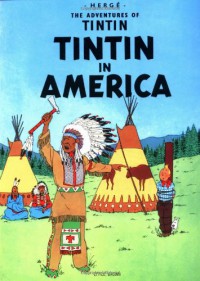 While it's one of the earlier Tintins, this one already bears many classic hallmarks of the series. Tintin is in constant danger, and always escapes by the skin of his teeth. In many instances, the reason for his escape is something wonderfully ridiculous and improbable. Oh, and these occur every few pages! While it might seem contrived and repetitive at first (and it is!), one quickly realizes that it is also a large part of the humor and appeal of Tintin.
While it's one of the earlier Tintins, this one already bears many classic hallmarks of the series. Tintin is in constant danger, and always escapes by the skin of his teeth. In many instances, the reason for his escape is something wonderfully ridiculous and improbable. Oh, and these occur every few pages! While it might seem contrived and repetitive at first (and it is!), one quickly realizes that it is also a large part of the humor and appeal of Tintin. The comics never take themselves seriously, and Tintin's absurd escapes are a constant source of their humor. What insane method will he use to get out of the next jam?
In terms of other series standbys, Snowy, Tintin's awesome pet dog, is an important companion, although he hasn't been given much personality yet. Also, Rastapopoulos, the chief villain of the series, makes a brief cameo appearance at the very end.
Overall, this is not as good as most later Tintins, including the very next in the series, "Cigar of the Pharaohs".
The transitions between panels often seem haphazard, and there is no coherent, unifying story. Nor is there any mystery to solve, something later Tintins would thrive on. And of course, it will be a while yet before we meet Professor Calculus and my childhood favorite of the series, Captain Haddock!
Still, it's an early, fun Tintin. The series should never be confused for literature (they're just cool comics for kids), but I loved them in my youth.
Why I'm Afraid Of Bees (Goosebumps Series)
 Read this back when I was nine years old, during a study hall where I hadn't brought a book from home. Even then, I recall thinking how utterly lame and tepid the story was. Seriously, someone thought this even remotely qualified as horror, even for kids?!
Read this back when I was nine years old, during a study hall where I hadn't brought a book from home. Even then, I recall thinking how utterly lame and tepid the story was. Seriously, someone thought this even remotely qualified as horror, even for kids?! Beyond that, it's a generic, unimaginative kid's tale with the morale "be thankful for what you have!" Like the rest of RL Stine's works, it's an utter hack-job that he wrote in under a month. (New Goosebumps were released once a month for 4 years from 1994-1998) As you can imagine, they're repetitive as all hell, and the quality is disastrous.
The Haunted Mask II (Goosebumps)
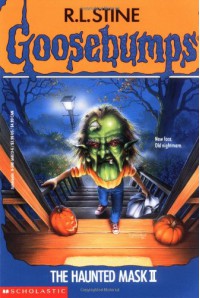 Like the rest of RL Stine's works, it's an utter hack-job that he wrote in under a month. (New Goosebumps were released once a month for 4 years from 1994-1998) As you can imagine, they're repetitive as all hell, and the quality is disastrous.
Like the rest of RL Stine's works, it's an utter hack-job that he wrote in under a month. (New Goosebumps were released once a month for 4 years from 1994-1998) As you can imagine, they're repetitive as all hell, and the quality is disastrous.This one is especially shameless, however, as it's the exact same story as the original "The Haunted Mask", only with minor, incidental changes to the main character and the appearance of the mask. The story itself wasn't frightening, but having to wade through clunky, imbecilic writing, and pointless, space-wasting filler was.
I was definitely a glutton for punishment as a kid.
Blubber
 Jill is an ostensibly innocent spectator to her friend Caroline and several others bullying Linda, a fat girl. This goes on for most of the book, with Caroline constantly proving herself a more fearsome, expert bullier than anyone I've ever met in life. (Boys, teenagers, and TSA personnel included) Eventually, there is a major change in Linda's social status, and it's handled about as gracefully as a pregnant elephant performing ballet on a frozen lake.
Jill is an ostensibly innocent spectator to her friend Caroline and several others bullying Linda, a fat girl. This goes on for most of the book, with Caroline constantly proving herself a more fearsome, expert bullier than anyone I've ever met in life. (Boys, teenagers, and TSA personnel included) Eventually, there is a major change in Linda's social status, and it's handled about as gracefully as a pregnant elephant performing ballet on a frozen lake. I remember having to read this book in 3rd grade and absolutely despising it. It has the usual Judy Blume flaws; poor, clumsy use of language, with the convenient cop-out that she's writing from the first-person perspective of a semi-literate, pre-pubescent girl.
It's also peppered with irritating personal details about the narrators' lives that are supposed to be funny or quirky, but come across as lame, hokey, and forced.
However, the main sin of this book is much worse. One so vile that most of Judy Blume's other works actually manage to avoid it. Namely, it has no point.
What exactly are we supposed to get from Caroline bullying Linda? The book never makes any over-arching statement on the matter. Nothing about the mindset of the bullier, the victim, what to do, how it can change, or anything of the sort. Instead, all we get is a dry, boring account of the bullying.
Even the defense of "realism" doesn't work, because as mentioned above, Caroline is just so laughably unrealistic in her bullying ability. It's not that she's too mean either, but that she's far too smart and sophisticated with her tactics.
The bullies I've encountered in life were never subtle or intelligent. They were just nasty and relentless.
Which, incidentally, Caroline is not.
So what else do we have? The idea that bullying sucks? Well sure... and two plus two makes four.
So essentially, Blubber is a poorly written book with lousy jokes and irrelevant trifles, fails at realism, has an awful conclusion, and possesses no real point.
Avoid it like the plague.
Aunt Julia and the Scriptwriter: A Novel
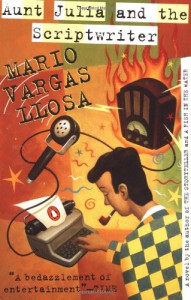 Ostensibly, this book follows two concurrent plots. One being the romance between Mario and his Aunt Julia, and the other being the crazy tales that Pedro Camacho writes for a Peruvian radio station. Chapters alternate back and forth between the two.
Ostensibly, this book follows two concurrent plots. One being the romance between Mario and his Aunt Julia, and the other being the crazy tales that Pedro Camacho writes for a Peruvian radio station. Chapters alternate back and forth between the two.The first problem is that these two plot lines have almost no connection with one another. Yes, Mario works at the radio station and has several conversations with Pedro. However, he is merely a passive observer, with zero influence upon Pedro's story.
I thought a stronger link would be established between the two narratives as the book went along. Alas, it never was, and what we get are two different novels crammed between the same covers.
Speaking of which, the courtship between Mario and Julia is among the laziest and most boring romances I have ever read. Vargas Llosa offers us nothing beyond a barren description of events. Julia gets divorced, is really sexy, Mario notices, makes advances towards her, they elope, and then decide to marry. That's essentially it. No deep conversations, no conflicting feelings, no conflict, period.
It has all the wit, charm, and depth of hearing a hung-over college kid describe how he picked up a floozy at the sorority last night.
However, the other "book", Pedro Camacho's stories, do possess a certain charm. They're wonderfully sordid trash, rife with murder, sex, pregnancy, and incest. They're everything one can expect from modern-day Hispanic "telenovelas" (their version of soap operas).
However, as Pedro buckles under the strain of working 16+ hour days, his stories become increasingly deranged, to hilarious results.
While this was easily the best part of the book, it ended up going on for too long, stretching a good joke past the point where it was funny. Then again, even beating a dead horse was preferable to hearing more stale details of Mario and Julia's relationship.
As noted before, there is little attempt to connect these two storylines, and the result is a predictably weak whimper of an ending.
Ultimately, I can't recommend people to read "Aunt Julia and the Scriptwriter". Rather than being a cohesive novel, it's two unconnected stories, one completely terrible, and the other containing a funny, clever idea which nevertheless becomes stale well before it ends.
The Overton Window
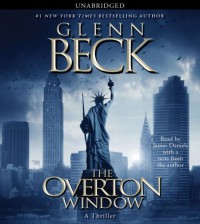 Looking through the other reviews, it's obvious that many of them never bothered reading the book at all. Rather, they saw the name "Glenn Beck", proceeded to give it 1 star, and typed up a review smearing it as loathsome trash, and Beck the worst human being on the face of this Earth.
Looking through the other reviews, it's obvious that many of them never bothered reading the book at all. Rather, they saw the name "Glenn Beck", proceeded to give it 1 star, and typed up a review smearing it as loathsome trash, and Beck the worst human being on the face of this Earth. In some cases, not having read the book is acknowledged in the write-up. In other cases, they write remotely plausible-sounding things about the work. (Like how supposedly bad the writing is) Those criticisms seemed reasonable enough to me...until I actually read "The Overton Window".
This book is not polemical. The words "Democrat" and "Republican" don't appear a single time throughout any of its 417 pages. Indeed, the book frequently talks about "both candidates" being similarly corrupt, incompetent, and easily controlled. Certainly, that's a sentiment I believe most of us share nowadays.
What is the book actually about? Noah Gardner is the son of Arthur Gardner, a 74 year-old PR power broker who has applied the insidious teachings of Edward Bernays better than anyone else. Bernays, the nephew of Sigmund Freud, was supposedly the first to control and shape the ideas the general population with ads, biased news articles, etc.
Noah works as a VP in his father's firm, thinking little of what is going on around him. However, he becomes entangled with a beautiful young girl named Molly, who is a part of a movement to re-mold government into the more functional and less freedom-crushing form it once possessed. She bases her beliefs on those of the Founding Fathers, while tracing the rise of the cancer that has seeped in and slowly poisoned the US government since the early 20th century.
As is acknowledged from the early pages, Noah is smitten with her, and thus begins his descent into a world of intrigue, murder, and his father's all-encompassing plan for the US, framed as a part of something called "The Overton Window"...
With regards to the style of writing, "The Overton Window" is a standard, professionally penned thriller. Nothing particularly good, nothing especially bad. Beck is not an author himself, and he acknowledges receiving help in the credits from actual pros. One easy way to spot someone who hasn't read the book but is slamming is if they criticize the prose.
The book is realistic, and our heroes don't manage to smash any giant government conspiracies or anything. On the contrary, the villains attain a partial victory. This is very refreshing, even if I think the idea of an evil mastermind like Arthur Gardner is far-fetched. In reality, I think it's a bunch of news people, most of them quite stupid, that inject their political biases into the stories they report. (And on CNN, MSNBC, and Yahoo! News, they happen to be liberals...)
There is also a good dose of humor, always used at an appropriate point in the novel. In addition, there is a smattering of action, which isn't done particularly well, but helps keep things fresh. For the most part, the novel stays engaging and fast-paced throughout, hitting several entertainment high notes at the end of its first and final, third parts. The biggest lull occurs in Part 2, with too many repetitive arguments and discourse from Molly. Another weak point happens near the middle of Part 3, with an embarrassingly goofy sequence with Molly quoting from Star Wars.
The political ruminations themselves are interesting and well-stated. They deal primarily in facts and exact quotes, and there are solid arguments that an open-minded person of any political persuasion should at least hear out. (Who doesn't think many of the bail-outs were a bad idea? Who doesn't think Social Security is a Ponzi scheme the government uses to get inside our wallets? Who doesn't think Freddie Mac and Fannie Mae are greedy companies saved by their cronies in Congress?)
Overall, it's a good, quality thriller with a strong grip on reality, several strong parts, as well as a few weaknesses and failings. Definitely worth checking out for anyone who isn't blinded by hate for the author's name.
Grant Hill
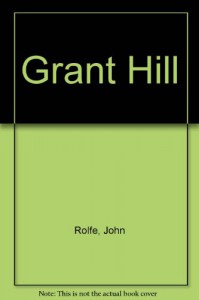 Don't expect anything particularly interesting or special here. It's a Sports Illustrated biography of Grant Hill who, at the time it was written in the mid-1990s, was the NBA's brightest young star. Hill was set to replace Michael Jordan as the NBA's main icon. Oh, how a few bad luck injuries robbed Grant and his fans of what should have been a legendary career...
Don't expect anything particularly interesting or special here. It's a Sports Illustrated biography of Grant Hill who, at the time it was written in the mid-1990s, was the NBA's brightest young star. Hill was set to replace Michael Jordan as the NBA's main icon. Oh, how a few bad luck injuries robbed Grant and his fans of what should have been a legendary career...Anyways, it's a straightforward, simplistic biography that is intended for kids. The language is simple, and so is their treatment of Grant's life. All the stuff about Hill, his family, and teammates is overwhelmingly positive. This works to some extent with its main subject since Grant Hill is considered one of the nicest, humblest, and most genuine NBA players of the past two decades, and his loving parents always come across wonderfully in interviews. However, it's downright disingenuous when it comes to many of Grant's teammates (Christian Laettner, Cherokee Parks) and even coaches (Don Chaney), of whom you won't read a single negative word about in this book, contrary to every profile or article.
While that might be partially forgiven in a kid's book treating the athletes as heroes who can do no wrong, it's difficult to excuse how utterly bland the description of games was!
Aside from simple box score stats, (mainly just the final score and Grant's own personal stats) we are barely told anything about the memorable games he played in! Even the description of the legendary Kentucky-Duke game which Laettner won with a buzzer beater has no description of what occurred on the court aside from the last shot.
I honestly believe the authors didn't even bother watching most of these games, but took the lazy way out, figuring that hey, it was just a book for kids!
And while a kid back in the 90s might learn some neat things about Grant Hill and several other players from this book, it's a lousy, worthless biography for anyone else. And even when it comes to kids, the authors short-changed that audience with their barren, lackluster game descriptions.
The Sharp End (Hammer's Slammers Series #7)
 When I picked up The Sharp End as a teen, I wasn't expecting much. Some quality action, violence, and adventure. That's all I asked for. Sadly, the book couldn't even deliver on that.
When I picked up The Sharp End as a teen, I wasn't expecting much. Some quality action, violence, and adventure. That's all I asked for. Sadly, the book couldn't even deliver on that. However, it should firstly be noted that this is "science fiction" by only the loosest and most liberal of definitions. Aside from spaceships and settlements on other planets, there is not a single element in the entire book that wasn't present on Earth in 1993. Forget presenting a rich, vibrant universe filled with creative ideas. There isn't even anything faintly futuristic about this book, even in the most generic science fiction sense.
One would think that at least the WEAPONS would be different in some way. Nope. Same old guns as ever, although the drones in this book's universe are even deadlier than the ones we have on Earth. (And they're given a different name)
Unfortunately, the book is equally bad at pulp fiction as it is at science fiction. The Sharp End begins by introducing each character through a short story.
Both characters and stories are as dull and generic as can be. There is the big, hulking, brute who is secretly kind and sensitive. There is the scary-calm, slightly psychotic mega-badass. There is the female badass who has no other distinguishing features other than her reproductive organs. Finally, we have the unit's leader, Major Matthew Coke, who is a determined, tough, but still human badass.
Once the crew finally lands on the crime-infested planet, it all follows a very familiar format. We're introduced to a poor, struggling, beautiful woman Pilar, who Coke saves and then falls in love with. There is the display of evil and brutality by the criminals soon after our heroes land. This is then followed by an effective early strike from the badass squad.
There is no real intrigue or complications injected into the battle between the squad and the gangs. In fact, the gang members are utterly faceless and forgettable.
Furthermore, at no point does the reader feel that the protagonists are in serious danger. Nor does there seem to be much at stake, aside from the unexceptional damsel in distress.
Not only is the story generic almost to the point of self-parody, but it is told in the most dull, curt manner possible. The action is not vivid, nor is it brought alive by the author's imagery. In fact, there is rarely much description at all.
The result is that the "action" primarily consists of one character pointing his gun at an enemy, shooting, and either hitting or missing. With little offered beyond that.
Whether you're looking for a sci-fi action story or a pulp fiction tale with even a minimal amount of entertainment, you will be sorely disappointed in this offering.
Complete Works of Edgar Allen Poe
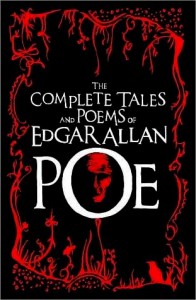 It's always difficult to review such an influential classic. Poe's Gothic horror and fiction short stories are among the most famous and influential works in all of literature. They are as ubiquitous in the school curriculum as they are in television and film adaptations.
It's always difficult to review such an influential classic. Poe's Gothic horror and fiction short stories are among the most famous and influential works in all of literature. They are as ubiquitous in the school curriculum as they are in television and film adaptations.Hell, along with Dickens, Poe's stories about amateur detective Dupin largely created that genre, even if it would not become more formalized until Wilkie Collins' "The Moonstone".
At this point, one is almost rating the culture and legacy of the work as much as the stories themselves.
All that aside, I couldn't ignore several problems of Poe's work. While the stories usually contain an interesting premise, are decently written, and in no way "poor", they are also very simple and straightforward. In some cases, they even become primitive and predictable.
Thus, while most stories are perfectly enjoyable, I rarely felt particularly impressed, let alone that I had read a true short story classic the same way I did with Fitzgerald, O Henry, Dreiser, Maugham, Kafka, and others.
Is there any depth to his characters? Are his stories smart and witty? Are the endings unpredictable for any experienced modern reader?
No, no, and no. Hell, even the three tales featuring Detective Dupin, the precursor to Sherlock Holmes, don't display any brilliant deductions or difficult mysteries.
Perhaps I'm being too hard on Poe. Maybe I'm judging him too harshly by modern standards. But keep in mind that we're talking about 1840 here, not 1640. Countless novels written back then, especially by the French realists, are still as intellectual, unexpected, and brilliant now as they were back then.
Yet, Poe's works don't have that depth to them. They're fun, simple Gothic tales, with ideas that particularly well in the later medium of film.
But are they truly timeless, deep masterpieces? Can an experienced reader going through his stories today still be deeply awed and impressed by them? I don't think so.
For me, 3/5 stars is a "good" book, but not a great one. Which is the way I think about Poe; a good albeit simplistic writer whose influence (mostly positive) exceeded his ability.
Their Eyes Were Watching God
 For all the reviews of this book, both positive and negative, few point out what genre it occupies. To me, this is the key to understanding the work; "Their Eyes Were Watching God" is simply a trashy romance novel! Think Danielle Steel, except less explicit and sleazy because it was written in 1937.
For all the reviews of this book, both positive and negative, few point out what genre it occupies. To me, this is the key to understanding the work; "Their Eyes Were Watching God" is simply a trashy romance novel! Think Danielle Steel, except less explicit and sleazy because it was written in 1937.But once you examine the book from that perspective, it makes far more sense. Janie is the narrator and protagonist, an attractive woman who has never held down a job, and whose life revolves around her various love affairs.
First, she marries Logan Killicks. She doesn't care for him, and runs off with a prosperous older man named Jody. However, when he gets old and can't perform sexually, she tires of him. On his deathbed, she taunts the suffering man by telling him she has found another lover. (Emma Bovary has nothing on the cruelty of this Messalina!)
This man is a gambler, the lazy, selfish, and incompetent Tea Cake. He also beats Janie regularly, and she is expected to work hard to support him. However, Janie doesn't mind; she finds him irresistibly sexy and is in love.
While many reviewers decry what a horrible message this sends (and they're correct), I will give Zora Neal Hurston credit for a very realistic touch.
Sadly, men like Tea Cake are to be found throughout the world, among every race, and in every community, as are the women who love them. And frequently, said women are cruel, vicious idiots themselves, as is the case with Janie. (Although she is ostensibly presented as a hero throughout the novel)
It's also true that spousal abuse is tolerated and condoned more within the black community than it is say, among Asians, whites, or Hispanics, to this very day. If you feel upset at that comment, please direct your outrage at the army of black women who staunchly defended Chris Brown in the wake of him beating Rihanna half to death, and argued the (insert vile expletive here) had it coming.
But while I appreciate the realism, it's neither interesting nor does it have a point. In fact, the whole book lacks both entertainment or any real ideas behind it. Events occur, but they are neither original, well-described, nor illustrative of any thought.
But of course it doesn't feature any of that! It's a trashy romance novel, remember?
However, even judged against the standards of that genre, "Their Eyes were Watching God" is quite lousy.
The description of the romance is tepid and unappealing. None of the characters come across as remotely sexy or even likable. They are nasty, vicious, venal personas. It doesn't help, as others have mentioned, that the language is stilted and further encumbered by being written phonetically.
Thus, "Their Eyes were Watching God" is a crappy, trashy romance novel. Although, with the passage of time, it's slightly improved, and is now a crappy, trashy, historical romance novel!
Things Fall Apart
 At its core, "Things Fall Apart" is a simplistic, no-frills, predictable tale. It's written competently enough, but there is absolutely nothing special or impressive about it.
At its core, "Things Fall Apart" is a simplistic, no-frills, predictable tale. It's written competently enough, but there is absolutely nothing special or impressive about it. Okonkwo is the proud, merciless tyrant of his African village, owning multiple wives and children, lording his authority over those weaker than him. Things fall apart for him when white colonists enact a less oppressive, fairer society that doesn't include Okonkwo holding absolute power.
I wish there was more to write, but the book is astonishingly bare-bones. Okonkwo is the only important character, and most of the story is concerned with mundane elements of his happy reign, such as the harvesting of yams or celebration of festivals. Even more problematically, Okonkwo is a rather simple fellow, relishing his strength and power, and despising those weaker him. It's probably an accurate description of a local African warlord, but as the dominant subject of "Things Fall Apart", there just isn't enough depth or intellect to him.
What I find curious is that Okonkwo, essentially a sadistic slave-owner using and abusing the serfs of his village, is portrayed as a tragic hero, while the white Christian missionaries, who teach that "all men are created equal" and that such abuse shouldn't be tolerated are the antagonists.
It's even more curious when you realize that Chinua Achebe has made an academic career from decrying perceived racism, and yet, here he is making a violent, selfish slaveowner the hero, and those fighting for equality the villains. Guess the fact that the former is black and the latter white changes everything though, doesn't it?
Shadow of a Bull
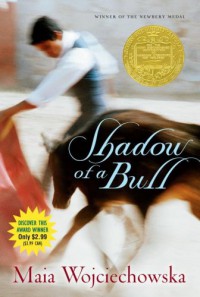 Even as a kid, I hated most children's literature, and that was especially true of Newbery works. While it's hardly great literature, "Shadow of a Bull" represents one of their very best.
Even as a kid, I hated most children's literature, and that was especially true of Newbery works. While it's hardly great literature, "Shadow of a Bull" represents one of their very best. For starters, the book is set in the bullfighting world of Spain in the 1920s, and author Maia Wojciechowska goes to great lengths in describing it. We learn about specific bull-fighting techniques, the type of cloth used to bait them, the various men ready to lance the bull, as well as the type of bull used. (After a certain amount of experience, we are told, the bulls will stop going for the cloth and instead rush the matador)
Imagine that, a children's author who actually did his/her research! Learning this information is interesting in its own right, but it also helps the bullfighting world become vibrant and alive.
The plot, while being fairly simple, is a solid one that most kids can relate to.
Manolo is the son of a famous bullfighter and expected to carry on the tradition after his father's death. However, he has little passion or ability for the craft. Nevertheless, he is faced with the pressure of living up to expectations, especially familial ones.
Without being overly dramatic and sentimental, or introducing any horrific event, the author came up with a decent, appealing premise.
Along the way, Manolo meets a boy named Juan Garcia who, despite his family's poverty, is himself a talented young bullfighter that simply needs a chance in front of a big crowd. With his help, Manolo trains hard and strives to become the great bullfighter the townspeople expect him to be.
The ending is a satisfying, if overly convenient one. At the very least, it makes sense given the previous events of the story, and what we know about each character's personality traits. Again, a logical ending might seem like standard stuff, but the vast majority of Newbery books I have read fail this criteria.
While "Shadow of a Bull" has its basics down well (strong research, solid plot, logical ending), it never goes beyond them. The discussions about Manolo's fear and bull-fighting performance become a bit repetitive, and feel like filler before the climax.
There are few characters (six total, including very minor ones), and only Manolo and Juan Garcia are especially important. In fact, Manolo himself is the only one with any depth; Juan Garcia is less a boy and more a representation of young bullfighting perfection.
Nevertheless, "Shadow of a Bull" succeeds in telling a decent story, especially for a child audience, for which I award it three out of five stars.


